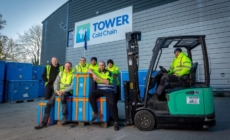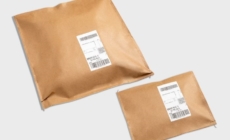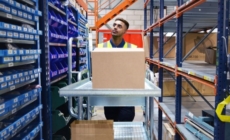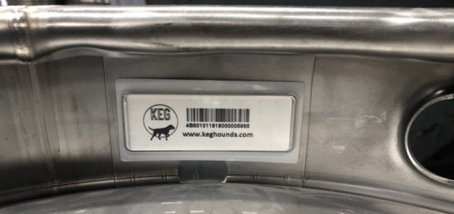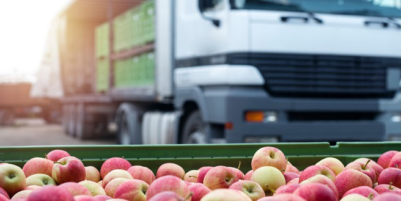-
Tower Launches Customer Sustainability Hub with Practical Tools for Lower-Impact Pharmaceutical Cold Chain - October 16, 2024
-
Six decision-making models for best practice WMS digital transformation - October 16, 2024
-
“Transforming Logistics: Precision and Purpose” – BIFA takes centre stage - October 15, 2024
-
JAMES JONES & SONS LTD EXPANDS ITS PALLETS & PACKAGING DIVISION THROUGH THE ACQUISITION OF HG TIMBER LTD - October 10, 2024
-
HUGO BECK EXPANDS MACHINE RANGE FOR E-COMMERCE, MAIL ORDER AND LOGISTICS - October 10, 2024
-
Winning Irish Exporter of the Year, Combilifts CEO Martin McVicar talks about the journey into the Global Market - October 8, 2024
-
JAMES JONES & SONS’ AUSTRALIAN SUBSIDIARY, HYNE GROUP, EXPANDS TO WESTERN AUSTRALIA - October 3, 2024
-
QUECLINK LAUNCHES SOLAR-POWERED ASSET TRACKER FOR TRAILERS AND CONTAINERS - October 3, 2024
-
Southgate Global Calls for Greater Health and Safety in the Warehouse Back Care Awareness Week - October 3, 2024
-
Nulogy to Expand Capabilities with Strategic Acquisition of Mingo Smart Factory - October 3, 2024
Passive RFID tag tracks stray barrels, helps breweries cut costs as hospitality industry reopens .
Omni-ID, the pioneer of passive industrial radio frequency identification (RFID) tags, which are relied on by major global organisations to provide information on the location and identity of assets, has launched a new tag for tracking beer barrels.
Developed in collaboration with US asset-tracking company, Keg Hounds, the patented tag attaches securely to kegs without requiring welding, adhesives, or special installation tools. It is IEC rated at ingress protection level 68 (IP68), indicating that it is fully dust and particle proof and highly resistant to rainwater. Each tag lasts at least ten years.
Keg Hounds has already supplied 100,000 tags to US and UK breweries, supported by an app and data analytics: allowing brewers to quickly track down their kegs if they are not returned after use.
As the hospitality industry re-opens following three months of COVID-19 lockdown, publicans, hoteliers and restaurateurs are focused on reducing any unnecessary cost and waste. Loss of empty beer barrels, when they are returned to the brewery, is a common pain-point for the industry. Each barrel is worth approximately £75, and keg loss can add millions of pounds to annual capital costs for brewers and hospitality venues.
Keg loss can be caused by distributors gathering up the wrong brewery’s kegs when collecting empty containers; identification tags being knocked off when kegs are stacked; wear and tear making tags unreadable; events organisers failing to return kegs; consumers turning kegs into barbecues; and the sale of stolen kegs to scrap metal merchants.
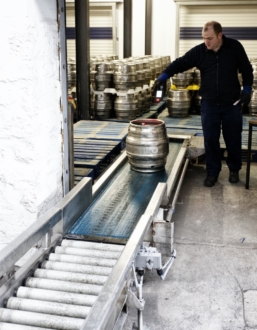
Between April 2019 and March 2020, UK not-for-profit Keg Watch helped brewers to recover 166,625 containers, worth £12,496,725.00. In March 2020 alone, 11,060 containers were recovered, worth £829,500.00, equating to approximately £75 a barrel. In the early months of this year, five vehicles were stopped at British ports carrying stolen kegs.
Keg loss is not confined to our shores. The Brewers Association estimates that each US brewery loses between 3%-5% of its kegs each year. With each keg costing around $100, US brewers are losing between $60M-$100M annually. Global keg losses are estimated to cost the brewing industry between $300M and $500M each year.
Commenting on the latest patent granted to the company, Dr Tony Kington, PhD, chief executive officer of Omni-ID, said, “At £75 a keg, costs for the hospitality industry can stack up as quickly as empty beer barrels at the end of lockdown. We were keen to apply our RFID expertise help Keg Hounds to stem the flow of beer barrels out of their customers’ cellars and warehouses as well as tackling the environmental damage caused by barrels being carelessly discarded or smelted down.”
“Although The Chancellor has launched the ‘eat out to help out’ scheme, to entice consumers back into restaurants and pubs by halving the cost of meals throughout August, the scheme does not cover alcoholic drinks, so publicans really need to tackle waste on all fronts.” continues Dr Kington.


